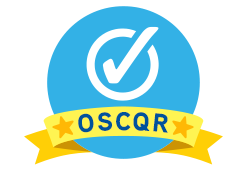OLC and SUNY Online Update Course Quality Rubric Based on New Federal Requirements for Distance Education
Supports higher education in addressing U.S. Department of Education regular and substantive interaction (RSI) requirements
BOSTON, April 28, 2022 – The Online Learning Consortium (OLC) and SUNY Online today announced the release of an update to the free OLC OSCQR Course Design Review Scorecard. This OSCQR 4.0 scorecard is the first online course quality rubric to account for recent U.S. Department of Education (DoE) regular and substantive interaction (RSI) regulatory requirements for online and distance education.
Institutions are seeking assistance in successfully navigating the new RSI regulation and risk losing access to student financial aid if the institution is audited and found to be out of compliance by the DoE Office of Inspector General, or as part of a periodic Departmental financial aid program review. The new DoE regulatory definitions of distance education that went into effect on July 1, 2021, require that institutions ensure RSI between instructors and students in all online/distance education courses for financial aid purposes. Regulations related to RSI have not been waived due to the COVID-19 pandemic.
OSCQR, developed by SUNY Online and adopted by OLC in 2016 as its online course quality scorecard, is an openly-licensed, freely available set of online course quality standards, online interactive tools, and resources that are research-based, customizable, and non-evaluative for anyone to use and adapt. It assists in ensuring awareness of best practices in the instructional design of new and existing online courses, and targeted initiatives to continuously improve the design, accessibility, and now regular and substantive interaction. The self-assessment tool has already been downloaded nearly 9,000 times. The interactive OSCQR rubric and dashboard have also been updated and are available.
“As the learning landscape continues to evolve with emerging pedagogies, technologies, and regulations, OLC is excited to collaborate with partners, like SUNY Online, to share effective practices that support quality online learning experiences with the education community,” said Nicole Weber, Associate Vice President of Learning at OLC. “It’s important to remember that this is just one piece of the equation. It’s also essential that educators receive additional support from their institutions, including faculty/ID training, awareness building and online teaching skills, and institutional/departmental policy and monitoring.”
Instructional designers and faculty, as well as administrators and distance learning leaders can leverage OSCQR. This tool can support online course quality assurance initiatives, faculty self-assessments, faculty training activities, course reviews, and can be used as recommendations and standards to support and document how the online course meets the RSI requirements.
“SUNY Online is very pleased to share the updated OSCQR to support online educators, instructional designers, and institutions in navigating the new RSI requirements,” said Alexandra M. Pickett, Director, Online Teaching, SUNY Online. “I am also thankful to the all-volunteer workgroup from across the SUNY system who worked together to review and update OSCQR and ensure that RSI is clearly visible, articulated, and highlighted in specific OSCQR standards, and in all related OSCQR support materials.”
Additional details regarding the new RSI regulation are available at SUNY Online and in a free OLC webinar, How to Increase Regular and Substantive Interaction (RSI) in Online and Distance Learning.
Best practices in the instructional design, student engagement and the RSI regulatory requirements were among the topics of discussion at OLC Innovate being held virtually March 28-April 1, and in Dallas, April 11-14. Learn more at olcinnovate.org.
Western Governors University (WGU) adopted the OSCQR Course Design Review scorecard as its primary method for measuring course quality. Read more in this blog post by Maren Toone, WGN Senior Manager, Production and Quality.
About Online Learning Consortium
The Online Learning Consortium (OLC) is a collaborative community of education leaders and innovators, dedicated to advancing quality digital teaching and learning experiences designed to reach and engage the modern learner – anyone, anywhere, anytime. OLC inspires innovation and quality through an extensive set of resources, including, best-practice publications, quality benchmarking, leading-edge instruction, community-driven conferences, practitioner-based and empirical research and expert guidance. The growing OLC community includes faculty members, administrators, trainers, instructional designers, and other learning professionals, as well as educational institutions, professional societies and corporate enterprises. Visit onlinelearningconsortium.org for more information.
About the State University of New York
The State University of New York is the largest comprehensive system of higher education in the United States, and more than 95 percent of all New Yorkers live within 30 miles of any one of SUNY’s 64 colleges and universities. Across the system, SUNY has four academic health centers, five hospitals, four medical schools, two dental schools, a law school, the state’s only college of optometry, and manages one US Department of Energy National Laboratory. In total, SUNY serves about 1.3 million students in credit-bearing courses and programs, continuing education, and community outreach programs. SUNY oversees nearly a quarter of academic research in New York. Research expenditures system-wide are nearly $1.1 billion in fiscal year 2021, including significant contributions from students and faculty. There are more than three million SUNY alumni worldwide, and one in three New Yorkers with a college degree is a SUNY alum. To learn more about how SUNY creates opportunity, visit suny.edu.
Media contact:
Michael Chmura
Director of Communications and Community Relations
Online Learning Consortium
michael.chmura@onlinelearning-c.org


